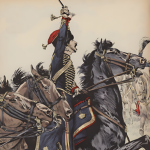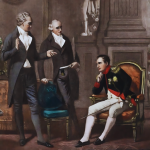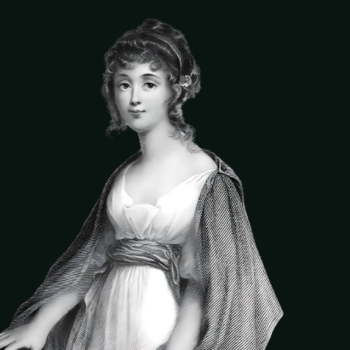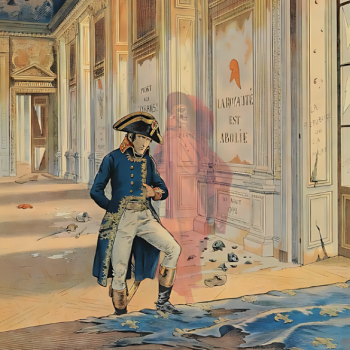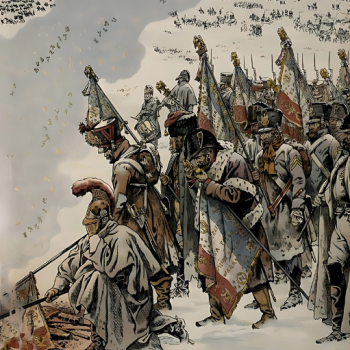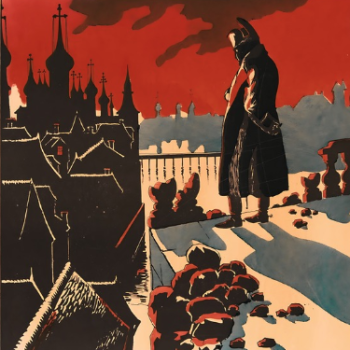A Tournament Of Shadows:
XV. He Ends With Steps Of Thunder Sound
Only after the Tsar and Emperor had settled the preliminaries was the humbled King of Prussia admitted to their company. It was with a sad countenance that he learned that the borders of his kingdom had been reduced to Old Prussia, Pomerania, Brandenburg, and Silesia. Napoleon, moreover, insisted that it should be registered in the treaty that he made these concessions solely out of consideration for the Russian Tsar. This was insult to injury after defeat. Out of the portion of Prussia on the left bank of the Elbe, the kingdom of Westphalia was to be formed for Jerome Bonaparte (the youngest of Napoleon’s brothers,) and neither the supplications of the Prussian Monarch nor the entreaty of his Queen, could induce Napoleon to modify his resolution.[1]
In the course of the conferences preceding the Treaty of Tilsit, Napoleon often told Tsar Alexander Pavlovich that Moldavia and Wallachia were destined someday to become Russian. He also spoke of the division of European Turkey as inevitable, indicating, as if inspired, a sharing of that empire (a portion of which was to be given to Austria to satisfy her pride.) A shrewd mind could notice the effect all those fanciful dreams produced upon the mind of Alexander Pavlovich. Napoleon watched him attentively and, as soon as he noticed that the prospects dazzled the Tsar’s imagination, he informed Alexander Pavlovich that letters from Paris necessitated his immediate return and gave orders for the treaty to be drafted at once. Talleyrand’s instructions on the subject of that treaty stipulated: “That no allusion to a partition of the Ottoman Empire should appear in it, nor even to the future fate of the two provinces of Wallachia and Moldavia.” These instructions were strictly carried out. Napoleon then left Tilsit, having made prospective arrangements which could serve him as he pleased for the accomplishment of his other designs.
Napoleon tried, for the first time, to take advantage of that situation at one of the receptions of the court in January 1808. He went up to Count Pierre de Tolstoy, the Russian ambassador, and took him aside, calling attention to the great advantages Russia would likely derive from the possession of Wallachia and Moldavia. He emphasized his fears of England’s ambition. “That country,” said Napoleon, “refused to listen to any proposal of peace, and obliged me to resort to all the means dictated by prudence, in order to reduce the power of all the countries with which there was some reason to believe she was in league. For the present, all prospects of a partition of the Ottoman Empire must be abandoned, because, to make an attempt upon Turkey, without possessing greater naval facilities, would be to place one’s most valuable possessions at the mercy of Great Britain.”
The report, which Tolstoy gave, was received unfavorably by the Tsar who said to the French ambassador “I can hardly believe the intelligence contained in Tolstoy’s dispatches. Is it intended to tear up the Treaty of Tilsit? I do not understand the Emperor! It cannot be that he wishes to cause me personal trouble. On the contrary, it is indispensable that he should clear me from responsibility in the eyes of Europe, by at once placing Prussia in the situation agreed to in the treaty. This is really an affair of honor with me.” This incident gave rise to certain explanations, resulting in a letter from Napoleon, which reached St. Petersburg at the end of February 1808. That letter contained: 1. “The implicit renunciation of all pretensions to Silesia. 2. “Fresh suggestions concerning the eventual division of the agreed portion of Turkish territory. 3. “A plan for carrying war into India. 4. “A proposal, either to send a responsible person to Paris to settle these important questions, if the Tsar could not come himself or to appoint a suitable place where the two sovereigns could meet.” In his letter, Napoleon, while proposing a partition of the Ottoman Empire, made no mention of the manner on how the territories taken from Turkey were to be divided. With the exception of the situation in Silesia (which was now removed,) things remained in the same uncertain state. Nevertheless, the Tsar was so relieved at no longer being obliged to stand up in defense of the private interests of the King of Prussia, that he received Napoleon’s letter with the utmost satisfaction.
Fully appreciating the strength of his position after the Treaty of Tilsit, Napoleon was anxious to remove all pretexts for hostilities in Europe. That is, until such time as when his designs in Spain were accomplished. Until that time, the project of a war in India, and that of a partition of the Ottoman Empire, seemed like “mere phantoms intended to occupy Russia’s attention.” Little in the way of remonstrance was worth mentioning between the respective Russian and French cabinets until their next meeting in Erfurt, Germany, where a Congress was held to reaffirm their alliance. Napoleon, wishing to make a grand show of the occasion, prepared to bring the best entertainment.
Though Napoleon enjoyed the theatre in a personal capacity, he recognized its value as a political tool and an instrument of propaganda. (His Imperial decrees in 1806 and 1807 reduced the number of Parisian theatres from fifty to eight, and limited the type of productions which could be staged at each venue.) Being one of the main sources of public entertainment, by supporting the theatres he positioned himself as a patron of the arts. Utilizing this tool most effectively, by attending the theatre, Napoleon cultivated his own image, “humanizing” himself by allowing people to observe his emotional reactions to the plays. This also offered him the chance to monitor his popularity by gauging how the audience reacted to his arrival at each performance.[2]
At every moment, he summoned Talleyrand (his grand chamberlain) to his presence, as well as General Duroc, grand marshal of the palace, and Charles Rémusat, who had the management of the plays.
“I wish my journey to be brilliant,” Napoleon repeated to them every day. At one of his lunches, where all three were present, he asked Talleyrand who were the chamberlains on duty.
“It seems to me that we have not any very aristocratic names,” said Napoleon. “I must have some. The fact is, that the members of the aristocracy are the only men who know how to be dignified at court. We must do justice to the French nobility. They are admirable in that respect.”
“Sire,” said Talleyrand, you have Comte de Montesquiou.”[3]
“Good.”
“Prince Sapieha.”[4]
“Not bad.”
“It seems to me that two will be sufficient. The journey being short, your Majesty could always have them with you.”
“Very soon, Rémusat, I must have a play. Send for Dazincourt—is he not the director?”[5]
“Yes, your Majesty.”
“I wish to astonish Germany by my splendor.”
Dazincourt, however, was out, so the arrangements for the play were put off until the following day.
“Your Majesty’s intention,” said Marshal Duroc, “is to engage certain important personages to come to Erfurt, and time is limited.”
“There is one of Eugene’s aides-de-camp who leaves today,” replied Napoleon.[6] “You might hint to Eugene what he must say to his father-in-law, the King of Bavaria—and if one of the kings come, they must all come. But no—we must not employ him. As for that, he is not quick enough. He knows how to do just what I wish, but he is worth nothing for acting a part. Talleyrand would do better,” he said, laughing. “Moreover, that, to criticize me, he will tell them that they will please me in coming. It will then be for me to show that I am perfectly indifferent, and that, if anything, their coming has annoyed me.”
At lunch the following day, Napoleon had Dazincourt sent for. Napoleon then told Rémusat, General Duroc, and Talleyrand to meet Dazincourt there (who awaited Napoleon’s orders.)
“You have heard that I am going to Erfurt?”
“Yes, your Majesty.”
“I should like the Comedie Francaise to come.”
“Would it be to play comedies and tragedies?”
“I only want tragedies. Our comedies would be of no use. They would not understand them across the Rhine.”
“Your Majesty would undoubtedly wish for a brilliant play.”
“Yes, our most beautiful piece.”
“Sire, we could have Athalie represented.”
“Athalie! fie on it! Here is a man who does not understand me. Am I going to Erfurt to put some Joash in those Germans’ heads.” Athalie! How silly of you! My dear Dazincourt, enough of this! Tell your best tragedians that they must prepare to go to Erfurt, and I shall give you instructions as to the day of our departure and the pieces that shall be played. How stupid those old people are! Athalie, indeed!—but then it is my fault; why consult them? I should not consult anyone. Still, if he had mentioned Cinna. That is a very interesting play, especially the scene of mercy, which is always good. Though I knew nearly all Cinna by heart, yet, I never could declaim well. Rémusat, are not the following lines in Cinna? ‘Tous ces crimes d’Etat qu’on fait pour la couronne. Le ciel nous en absout lorsqu’il nous la donne.’ I am not sure if I repeat the verse correctly.”
“Sire, it is in Cinna, but I believe that it is—‘Alors qu’il nous la donne.’”
“What are the following lines? Take a Corneille.”
“Sire, it is not necessary; I remember them—”
“That is capital, and especially for those Germans who always stick to the same ideas, and who still speak of the death of the Duc d’Enghien.[7] Their minds must be enlarged. I do not say that for the Tsar Alexander. Such things have no effect upon a Russian, but it is a good thing for men with melancholy ideas like the Germans—and Germany is full of such. We shall, then, have Cinna represented: that will do for the first day, Rémusat, you will look up the tragedies that can be given the following days, and you will report to me before making any final arrangements.”
“Sire, does not Your Majesty desire that a few good actors be left in Paris?”
“Yes — substitutes. We must take all the good ones. It will do no harm to have too many.”
The order for the desired actors to be present at Erfurt for September 22, was immediately sent out. The journey was announced in The Moniteur, and everyone tried to be a part of the party. Napoleon’s two aides-de-camp, Savary and Lauriston, were chosen first. The military retinue was to be very brilliant, Napoleon wishing to be accompanied by those lieutenants whose names had caused the most excitement in Germany. General Duroc appointed de Canouville to plan for the lodgings.
“Bring Beausset, also,” said Napoleon. “We really must have someone to introduce our actresses to the Grand Duke Constantin. He can also, at dinner, discharge his duties of préfet of the palace, besides he bears a great name.”
Every day someone left for Erfurt. The route was covered with wagons and saddle-and coach-horses, and some of the emperor’s livery servants. The month of September drew to a close. Talleyrand read over all the correspondence, but Napoleon had not yet discussed with him those important affairs that were to be treated. A few days before his departure, the grand marshal informed Talleyrand that Napoleon desired him to present himself at the grand reception that evening. Just as soon as Talleyrand entered the drawing-room he was met by Napoleon who led the way to his study.
“Well, you have read all the Russian correspondence,” said the Emperor. “What do you think of my move with Tsar Alexander?” He then recalled, in a humorous retrospect, all that he had done and written during the past year. He concluded by pointing out to Talleyrand the influence he had gained over the Tsar. As far as Napoleon was concerned, he had executed only what suited him regarding the Treaty of Tilsit. “Now, I shall go to Erfurt,” said Napoleon. “I wish, in returning, to be free to do what I wish in Spain. I wish to be assured that Austria will be afraid and hold back, and I do not desire to be engaged in too precise a manner with Russia concerning the affairs in the East. Prepare me a convention which will satisfy the Tsar Alexander, and be directed especially against England, and in which I shall be perfectly free for the rest. I shall help you, and the prestige shall not be lacking.’”
Talleyrand went two days without seeing Napoleon. In his impatience, the Emperor wrote what he wished the articles to contain and sent the note to Talleyrand, requesting that he should bring them to him drawn up, as soon as possible. Talleyrand did not make him wait, and a few hours later he went to him with the projected treaty drawn up as he had indicated. Napoleon looked over the papers.
“That is about all I have said to you,” said Napoleon. “Leave me this draft, I will arrange it. We must add to one of the last articles, to that one where I stopped you, that, in case Austria gave any uneasiness to France, the Tsar of Russia, on the first demand which would be made to him, pledges himself to declare against Austria, and to make common cause with France, this case being equally one of those to which the alliance which binds the two powers applies. This is the essential article. How could you have left it out? You are still an Austrian!”
“Somewhat, Sire,” Talleyrand replied. “Yet, I think it would be more exact to say that I am never a Russian, but always a Frenchman.”
“Make your arrangements to leave,” said Napoleon, “you must be at Erfurt a day or two before me. During the time of our stay there, you try to see the Tsar as often as possible. You know him well, you will speak to him in that language that suits him. You will tell him that in the benefit our alliance may prove to mankind, one recognizes one of the great purposes of Providence. Together we are destined to restore general order in Europe. We are both young, we need not hurry. You will insist greatly upon that—for Count Rumyantsev is sanguine about the Eastern Question. You will say that nothing can be done without public opinion, and that it is necessary that, without being scared by our combined power, Europe should see with pleasure the achievement of the great undertaking we contemplate. The security of the neighboring powers, the respect of the legitimate interest of the Continent, seven millions of Greeks restored to independence. All this constitutes a fine field for philanthropy. I will give you carte blanche for that. I wish only that it be distant philanthropy. Goodbye.”
Talleyrand returned home and put his papers in order; carrying away all that he thought he should require, he got into his carriage and set off. He arrived at Erfurt on the morning of September 24, 1808, and was put up in a lodging house near that which Napoleon was to occupy. A few minutes after his arrival, de Caulaincourt came to see him, and the first day spent together proved very useful to Talleyrand. They spoke of St. Petersburg, and of the disposition in which the two sovereigns had come to the interview. They told each other what they knew, and soon agreed upon all points.
All of Erfurt was in excitement. There was not a respectable house that did not provide accommodation for a sovereign. Napoleon’s pages had already arrived and were walking about the town in full dress. The military duties were performed by a battalion of grenadiers of the imperial guard; a detachment of picked gendarmes; the 6th regiment of cuirassiers; the 1st regiment of hussars; and the 17th regiment of light infantry. Napoleon entered Erfurt on September 27, greeted by an immense crowd that surrounded the avenues leading to the palace. On September 28, Alexander Pavlovich (who had been spending the night at Weimar) arrived with Grand Duke Constantine and a retinue consisting of Count Rumyantsev, Count Tolstoy, General Tolstoy, Prince Volkonsky, and others.[8] Napoleon rode up to meet him, followed by his aide-de-camp and his generals in full dress. The two sovereigns rushed to each other’s arms in the most friendly fashion, after which Napoleon led Alexander Pavlovich to the residence prepared for him, and having carefully ascertained that the Tsar was entirely provided for, took leave of him.
Talleyrand was in Napoleon’s palace, awaiting his return. He was pleased with the first impressions of his journey and told Talleyrand that he augured well of it, but that nothing should be hurried.
“We are so glad to see each other again, that we must be allowed to enjoy that feeling a little,” said Napoleon, laughing.
He had barely finished dressing when the Tsar arrived, and Talleyrand was introduced to him.
“He is an old acquaintance,” said Alexander Pavlovich. “I am delighted to see him again. I hoped he would be of our party.”
Talleyrand wanted to retire but, as Napoleon wished to avoid conversing on any serious subject, he desired that he should stay. The two Emperors conversed (with the most lively interest) insignificant family matters. The Russian Empress Elizabeth was the first topic of conversation. Then it turned on the French Empress Josephine, and then on the Grand Duchess Anne, and the Princess Borghese. The two sovereigns, feeling comfortable as to the state in which they had left their respective families, separated. Napoleon showed the Tsar to the stairs, and Talleyrand escorted him to his carriage. “Nous nous verrous,” said Alexander Pavlovich as they walked together.[9]
Talleyrand then went up to Napoleon, who said to him: “I have modified the draft of the treaty; I am taking more precautions against Austria. I will show it to you.” (He did not enter into any more particulars.) “The Tsar seems to me disposed to do anything I wish,” Napoleon continued. “If he speaks to you on the subject, tell him that I at first intended the negotiation to be made between Count Rumyantsev and yourself, but that I have changed my mind, and that my confidence in him is such that I think it better for everything to pass between ourselves. When the convention is settled, the ministers will sign it. Remember, though, in everything you say, that any delay will be useful to me. The language of all the kings about to meet here will be submissive—they fear me. Before discussing the real object of this meeting, I wish the Emperor of Russia to be dazzled by the sight of my power. For there is no negotiation that it could fail to render easier.’”
Napoleon had disposed of the first days so as never to be able to find a moment to speak of business matters. He spent a good deal of time over his lunch, receiving visitors with whom he willingly chatted. Then followed some visits to the public establishments of the country, from where he went to maneuvers outside the town, at which Alexander Pavlovich and Constantine never failed to meet him. Only a short time remained afterward to dress for dinner, which was succeeded by the play that concluded the day.
Some of these luncheon meetings lasted more than two hours, as Napoleon generally bid the eminent men who had come to Erfurt to see him. Every morning, he perused, with much interest, the list of new arrivals. One day, having noticed the name of Johann Wolfgang von Goethe among the number of newly arrived visitors. He immediately sent for him. The author had just published his latest work, Faust, the story of a man who makes a deal with the devil Mephistopheles. The opening lines of that work read: “The sun-orb sings in emulation. The ‘Mid brother-spheres, his ancient round; His path predestined through Creation. He ends with step of thunder sound.” [10]
Napoleon had a flair for the dramatic. It hardly mattered if he himself were superstitious, he found that the “legends” that surrounded him in his own time could be useful to his mythos. It was said that Napoleon paid a visit to a sorcerer named Pierre le Clerc in 1795 and expressed some doubt of his power. “You are wrong to doubt my art,” said the magician. “I know more than you probably imagine. There was a prophecy of a certain Count Cagliostro, uttered ten years ago, on the French Revolution, which was not then thought of. This announced that a Corsican, voted or elected by the people would finish it, probably by a Dictatorship.” Napoleon left the old man, and, so the story goes, did not visit him again until the eve of the fateful 18th Brumaire. The seer gave him a number of cards, on each of which he was to write one letter of the question he wanted to ask, which was: “What will become of the Corsican Napoleon Bonaparte, general, on account of the Coup d Etat risked by him, at Paris, the 18th Brumaire, 1799?” These cards were well mixed and handed to the conjurer, who, after some manipulation, settled on thirteen cards, having the letters B, O, P, P, I, A, I, B, I, P, A, U, F, each of these letters he interpreted as the beginning of a Latin word. On this basis, the magician constructed the following sentence: “Bis Oriens, Populi Princeps, In Altum Incedit; Bis Incidit; Per Anglos Ultima Fata.” (“He rises twice Prince of the People, and hovers over the heights; twice he falls; his last fatality will come from the English.”) Napoleon took fresh cards and wrote: “Josephine Marie Rose de Tascher de la Pagerie, wife of the General Napoleon Bonaparte.” Of these the conjurer selected three letters, H, E, A, which he interpreted as “Herois Extinctus Amor.” (Love extinguishes itself in the heart of a hero.)
The invulnerability of the Emperor was a fruitful theme, and he brimmed with anecdotes of the Egyptian and Italian campaigns where neither shot nor shell had any effect upon him. Of all the superstitions regarding Napoleon, however, none had such complete hold on the imagination of his men than that of the “L’Homme Rouge” (“Red Man,”) who it was asserted visited the Emperor the night before every great battle and arranged with him the maneuvers of the succeeding day. This apparition was something like the mysterious “Black Man” who, it was said, ordered Mozart’s Requiem.[11] This “Red Specter” was taken as such an article of faith in the French army, that few of the soldiers ever thought of disputing the story. Some thought he was Napoleon’s “genius,” or “genie,” that benevolently guided the conqueror.
The day before the Battle of the Pyramids, Napoleon and some of the officers of his suite, made a reconnaissance at those monuments that were the pride of the Pharaohs, when, suddenly, he saw coming out from it, a man clothed in a long red robe, wearing on his head a pointed cap of the same color. This mysterious “Red Man,” who carried a little ring in his hand, said these words to Napoleon: “Approach, young man, and learn the high destinies to which you are called, if you wish to be prudent and wise.” As if drawn by a supernatural force, Napoleon immediately descended from his horse, and followed him into the interior of the pyramid, and there remained more than an hour. Initially, the officers of his suite paid little interest to this rencontre, taking the “Red Man” to be one of those charlatans, with which the world abounds, “to the detriment of science and real knowledge.” They were astonished that Napoleon, to whom they accorded so much merit, lost precious time in interviewing a “wretched cheat.”
When Napoleon emerged again, radiant with joy, he told his men: “Friends, let us give battle; we shall conquer!” When these officers saw that, in spite of the inferiority of their forces, they gained the most complete victory, they could only think of the Red Man. “Is he a God? Is he a Genius?” That was what they asked. Balzac would later state in his delicious booklet, that Napoleon encountered the Red Man at Mount Sinai, and was told by the cryptic crimson that “All went well.”
From Egypt, the French only marched from victory to victory, until the departure of Napoleon for France. A minority believed the Red Man was not a friendly Counsellor of Napoleon at all, but a shadow figure, the Emperor’s evil genius, perpetually employed in thwarting his plans and opposing his views. Proponents of the belief that the Red Man was a benevolent being pointed out the Green Man, an evil Genius, who appeared to Napoleon at St. Cloud, at the time of the 18th Brumaire, and gave him counsels, which prevailed over those of the Red Man. At the Battle of Marengo, on the evening of the Victory, in Balzac’s telling, Napoleon saw the Red Man standing before him and said: “Thou shalt see the world at thy feet, and thou shalt be Emperor of the French, King of Italy, Master of Holland, Sovereign of Spain, Portugal, the Illyrian Provinces, Protector of Germany, Savior of Poland, First Eagle of the Legion of Honour.” At his Coronation, Napoleon saw the Red Man in the evening, and they were in deliberation about many things for many hours. Then the Emperor went straight to Milan to crown himself King of Italy. Some claimed the Red Man lived in the upper apartments at the palace of the Tuileries. Some believed this Red Man was Napoleon’s idea, a figment of imagination that helped him interface with the fates, a “kind of lackey, who helped him […] to communicate with his star.” Most everyone who believed in the Red Man agreed that this spectral visitor, be he good or evil, visited Napoleon during those critical moments when history pivots.[12]
~
Goethe was summoned to Napoleon’s office at eleven o’clock in the morning and found the Emperor seated at a large table speaking to the minister, Comte de Daru. “Monsieur Goethe,” said Napoleon, signaling for Goethe to approach. “I am delighted to see you.” The writer remained standing in front of him at a suitable distance.
“You are a man. I bow,” said Napoleon, after considering him for a moment. “How old are you?”
“Sixty years old.”
“You are well preserved.”[13]
“Sire, I see that when your Majesty travels, you do not neglect to notice even the most insignificant persons.”
“I know you are Germany’s first dramatic poet.”
“Sire, you wrong our country; we are under the impression we have our great men. Schiller, Lessing, and Wieland are surely known to your Majesty.”
Christoph Martin Wieland and Friedrich Schiller were two authors who belonged to a cultural and literary movement later known as Weimar Classicism (which combined the ideas of Romanticism, Classicism, and the Enlightenment.) Gotthold Ephraim Lessing, a philosopher and dramatist, was an influential figure during the German Enlightenment, and coined the phrase “dramaturgy” for the study of dramatic compositions.
“I confess I hardly know them. However, I have read La Guerre de Trente Ans, and that, I beg your pardon, seemed to me to furnish dramatic subjects only worthy of our boulevards.”
“Sire, I do not know your boulevards, but I suppose that popular plays are given there. I am sorry to hear you judge so severely one of the greatest geniuses of modern times.”
“You generally live in Weimar; it is the place where the most celebrated men of German literature meet?”
“Sire, they enjoy great protection there; but, for the present, there is only one man in Weimar who is known throughout Europe; it is Wieland.”
“I should be delighted to see Monsieur Wieland!”
“If Your Majesty will allow me to ask him, I feel certain that he will come here immediately.”
“Does he speak French?”
“He knows it and has corrected several French translations of his works.”
“While you are here, you must go every night to our plays. It will not do you any harm to see good French tragedies.”
“I’ll go willingly. I must confess to your Majesty that it was my intention, for I have translated, or rather imitated, some French pieces.”
“Which ones?”
“Mahomet And Tancrede.”
“I shall ask Rémusat if he has any actors here to play them. I should be very glad for you to see them represented in our language. You are not as strict as we are in theatrical rules.”
“Sire, unity with us is not so essential.”
“How do you find our sojourn here?”
“Verry brilliant, sire, and I hope it will be useful to our country.”
“Are your people happy?”
“They hope to be so soon.”
“Monsieur Goethe, you ought to remain with us during the whole of our stay and write your impressions of the grand sight we are offering.”
“Ah! Sire, it would require the pen of some great writer of antiquity to undertake such a task.”
“Are you an admirer of Tacitus?”
“Yes, sire, I admire him much.”
Well, I don’t—but we shall talk of that another time. Write and tell Monsieur Wieland to come here. I shall return his visit at Weimar, where the duke has invited me. I’ll be very glad to see the duchess; she is a lady worthy of much esteem. The duke was troublesome enough, for some time. But he has been punished.”
“Sire, troublesome though he may have been, the punishment was a little severe. But I am not a judge of such things; he protects literature and sciences, and we have nothing to say against him, but rather everything in his favor.”
“Monsieur Goethe, come tonight to Iphigénie; it is a good piece. It is not, however, one of my favorites, but the French think a good deal of it. You will see in my pit a great number of sovereigns. Do you know the Prince Primate?”
By this, Napoleon meant Karl von Dalberg, former Arch Chancellor of the Holy Roman Empire. After its dissolution, Dalberg was given the title Prince Primate of the Confederation of the Rhine.
“Yes, sire; almost intimately. He is very clever, very well informed, and very generous.”
“Well, you will see him, tonight, fast asleep on the shoulder of the King of Württemberg. Have you already seen the Tsar?”
“No, sire, never; but I hope to be introduced to him.”
“He speaks your language; should you write anything on the Erfurt interview, you must dedicate it to him.”
“Sire, it is not my habit to do so. When I first commenced to write, I made it a principle never to dedicate anything to anyone, in order that I should never repent it.”
“The great writers of Louis the Fourteenth’s time were not of your opinion.”
“But your Majesty cannot be sure they never repented doing what they did.”
“What has become of that scoundrel, Kotzebue?”
“Sire, they say he is in Siberia and that Your Majesty will solicit his pardon from the Tsar.”
“But he is not the man for me.”
“Sire, he has been very unfortunate, and is a man of great talent.”
“Goodbye, Monsieur Goethe.”[14]
SOURCES:
[1] Baring-Gould, Sabine. The Life Of Napoleon Bonaparte. Methuen & Co. London, England. (1897): 368.
[2] Sproule, Margaret. “Performing For The State: Censorship Of The French Theatre Under Napoleon.” The Corvette. Vol. II, No. 1 (Fall 2013): 68-80.
[3] Comte Pierre de Montesquiou-Fezensac.
[4] Prince Alexander Sapieha.
[5] Joseph Albouis Dazincourt.
[6] Eugene de Beauhamais.
[7] Louis Antoine de Bourbon, Duke of Enghien (August 2, 1772–March 21, 1804) was a member of the House of Bourbon of France. Napoleon had him executed in 1804, charging him with aiding Britain and plotting against the Imperial throne. This death indirectly drew the Republican party to Napoleon’s side by “definitely and irrevocably setting a gulf between him and the Monarchists.” [Barton, Dunbar Plunket. Bernadotte And Napoleon, 1763-1810: Vol. II. John Murray. London, England. (1921): 74.]
[8] Count Oszarowski, Prince Troubetzkoi, Count Ouwaroff, Count Schouwaloff, Prince Gagarin, Speranski, Labenski, Bethmann, General Hitroff, State Councillors Gervais and Creidemann, and Prince Leopold of Saxe-Coburg.
[9] Fr: “We will see each other.”
[10] von Goethe, Johann Wolfgang; (tr.) Bayard, Taylor. Faust. Houghton Mifflin Company. Boston, Massachusetts. (1911): 11.
[11] “The Gentleman’s Magazine Library.” The Pall Mall Budget. (London, England) August 27, 1885.
[12] Lever, Charles James. Tom Burke Of “Ours.” William Curry, Jun. And Company. Dublin, Ireland. (1844): 124-125; Ashton, John. English Caricature And Satire On Napoleon I. Chatto & Windus. London, England. (1888): 363-370; Wright, John W. “The Unusual, Ghostly, Superstitious, Queer: Napoleon’s Red Spectre.” Current Literature. Vol. XVIII, No. 3 (March 1895): 225.
[13] von Goethe, Johann Wolfgang. Oeuvres de Goethe: Vol. X. Mélanges. L. Hachette. Paris, France. (1863): 307-309.
[14] de Talleyrand-Périgord, Charles Maurice. Memoirs Of The Prince Of Talleyrand: Vol. I. Griffith, Farran. Okeden, And Welsh. London, England. (1891): 293-320.


